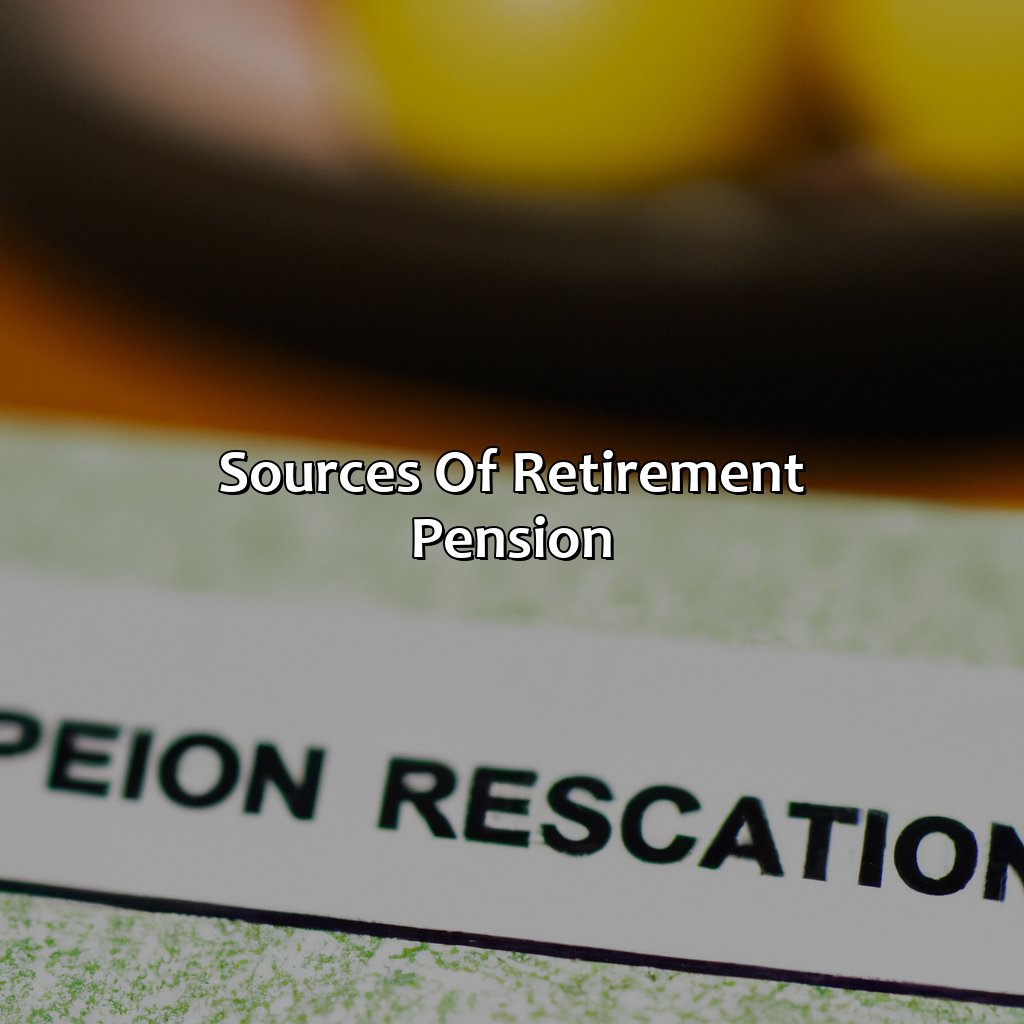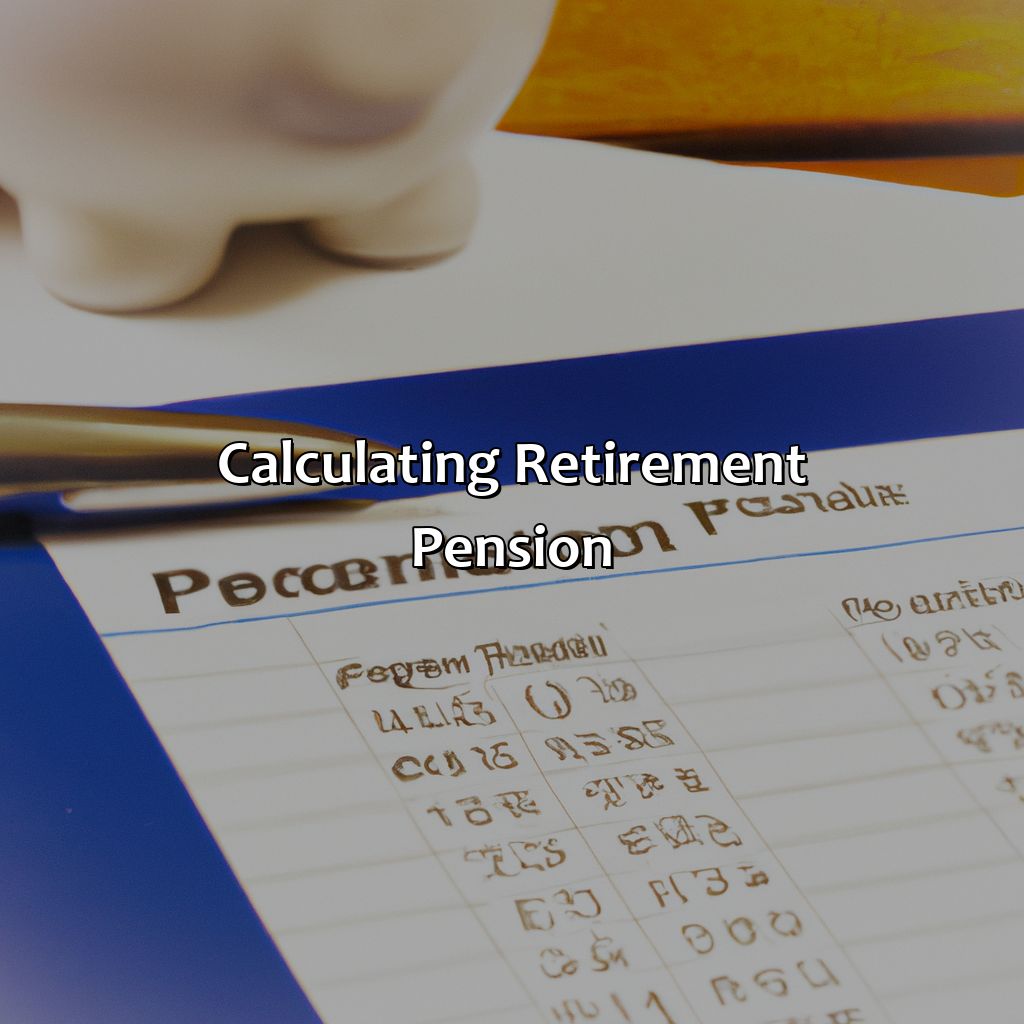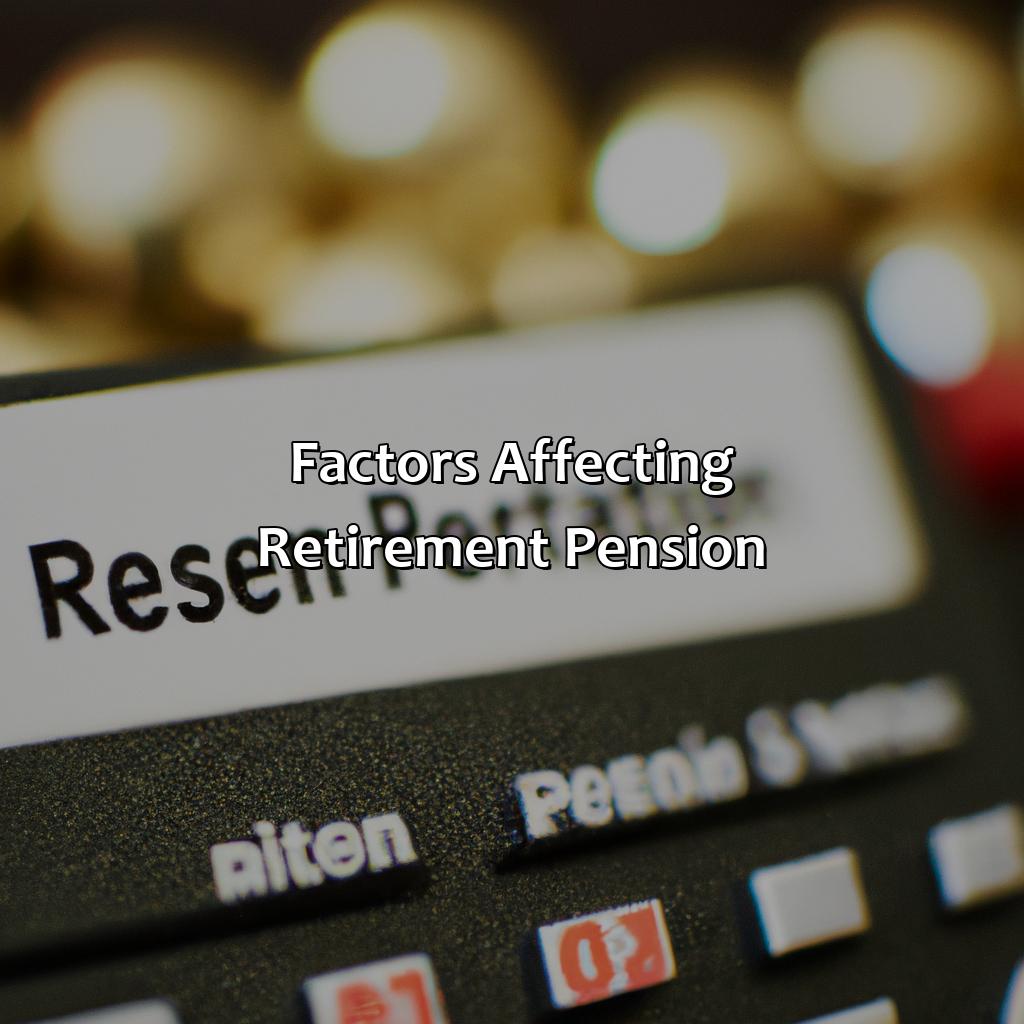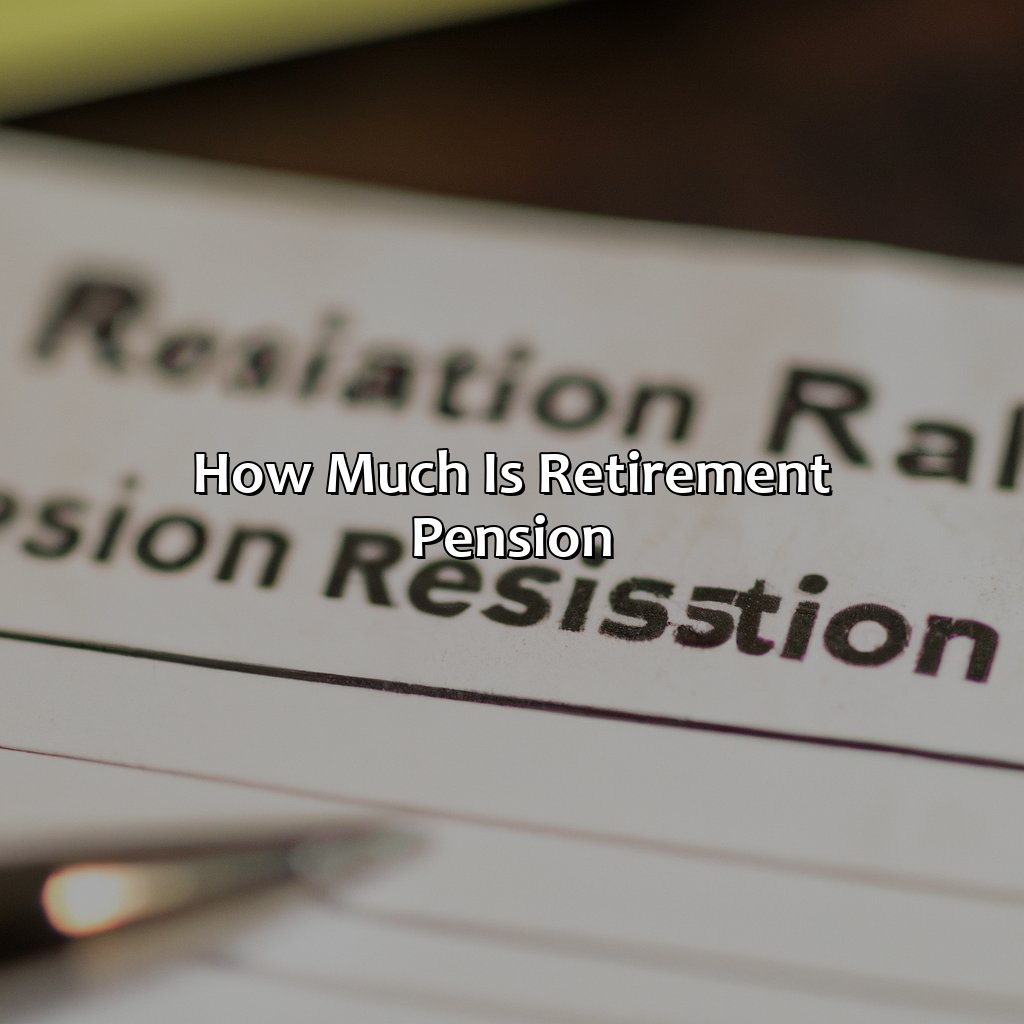How Much Is Retirement Pension?
Key Takeaway:
- Sources of retirement pension include Social Security benefits, employer-sponsored pension plans, and personal savings and investments. It is important to have a diversified retirement plan to ensure a comfortable retirement.
- Calculating retirement pension can be done through tools such as the Social Security Retirement Benefit Estimator, pension benefit statements, and financial planning tools. These tools can help determine how much retirement income can be expected.
- Factors such as age of retirement, length of service, contribution rates, and investment returns can greatly affect retirement pension. Planning ahead and being mindful of these factors can help maximize retirement income.
Are you concerned about securing your retirement? You deserve to know how much pension you’re entitled to and how to make the most of it. In this article, we’ll explore the ins and outs of retirement pensions and how they can benefit you.
Sources of Retirement Pension
Want to know where your retirement pension comes from? Look into Social Security Benefits, Employer-Sponsored Pension Plans and Personal Savings and Investments.
Social Security Benefits are funds from the government. Your employer could offer a pension plan. And Personal Savings and Investments are money you have saved in your own accounts.

Image credits: retiregenz.com by Harry Woodhock
Social Security Benefits
Eligibility for Social Security Benefits depends on an individual’s work history and contributions. The amount of monthly benefits received is based on an individual’s average wage earnings over their working years. Full retirement age is currently 67 years old for those born after 1960. There are several ways to apply for Social Security Benefits, including online or by visiting a local Social Security office. Social Security Benefits may be subject to income tax based on an individual’s total income sources.
In addition, it’s important to note that benefits can be affected by factors such as early retirement, postponed retirement, spousal benefits, or other unique circumstances.
Pro Tip: Understanding your options and eligibility for Social Security Benefits can be complex. Consider consulting with a financial advisor or the Social Security Administration for personalized guidance.
Retire rich or die trying: Employer-sponsored pension plans might just be the lifeline you need.
Employer-Sponsored Pension Plans
One common type of financial support for retirement is the benefit of employer-sponsored pension plans. These plans are usually funded jointly by employees and employers, with contributions being made on a regular basis throughout an employee’s working years. The money collected in these accounts is then invested in a diversified portfolio that aims to increase the value of funds over time.
Employers often have varying policies regarding eligibility, contribution amounts, vesting schedules, and payout options for their pension plans. For instance, some may offer a traditional defined benefits plan where a retiree receives fixed monthly payouts until death while others may provide flexible contribution limits with self-directed investment options or 401(k) type defined-contribution plans.
It’s important to note that not all employers offer pension plans as part of their benefits packages and many companies are shifting towards providing 401(k)-style accounts instead due to their lower costs and simpler administration needs. However, individuals can still save independently through Individual Retirement Accounts (IRAs), which come with their own tax deductions and savings perks.
Pro Tip: Consider speaking with a financial advisor to create a comprehensive retirement savings plan tailored to your specific goals and lifestyle needs.
Want to ensure a comfortable retirement? Don’t rely on your personal savings and investments. Just marry rich, or win the lottery. Easy peasy.
Personal Savings and Investments
One way to secure your retirement is by leveraging your personal assets. This includes investing in stocks, bonds, mutual funds, or even real estate properties. These avenues provide significant opportunities for growth and can be a great supplement to pension plans.
By diversifying your investments across multiple sectors and industries, you give yourself a better chance of profiting from any potential boom markets. Remember to always analyze the risks involved and seek professional financial advice before making any investments.
Additionally, contributing to Individual Retirement Accounts (IRAs), Roth IRAs or other savings accounts can help you build up your personal savings and retirement fund over time. By regularly depositing money into these accounts, you ensure that your wealth is continuously growing- potentially leading to larger fulfilling returns upon retirement.
It is important not to overlook the power of compounding interest when thinking about saving for retirement. Regardless of how small your contributions may seem today, every penny adds up in the long run – especially if coupled with intelligent investment choices.
Retirement pension calculations: it’s like trying to solve a Rubik’s Cube, except the only color is gray and the only reward is not having to work anymore.
Calculating Retirement Pension
Retirement pension calculating made easy! Use the Social Security Retirement Benefit Estimator. It will help you calculate your Social Security benefits. Pension Benefit Statements are also great. They give you personalized info about your pension. Lastly, Financial Planning tools are useful for calculating your retirement fund. All of these will help you get a comfy retirement.

Image credits: retiregenz.com by Harry Arnold
Social Security Retirement Benefit Estimator
For calculating the benefits of retirements, we have an advanced system known as the Retirement Pension Benefit Calculator. It assists in estimating the retirement pension that one will receive and provides financial security in old age.
Below is a table that displays information related to the Social Security Retirement Benefit Estimator:
| Column 1 | Column 2 |
|---|---|
| Age | How much you’ll receive |
| 62 | $985 |
| 65 | $1,340 |
| 70 | $1,755 |
The calculator uses information such as date of birth, expected year of retirement, earnings record, etc., to generate a custom estimate for each individual.
It is important to keep in mind that the information provided is an estimate only and may not reflect the actual amount received. To ensure accurate calculations, provide complete and precise data when using this tool.
To maximize social security benefits here are some suggestions – wait till full retirement age before claiming benefits, delay taking social security benefits until age 70 to get larger payments and earn income as long as possible while paying into social security.
Get ready for some hard truths with your Pension Benefit Statements, because ignorance may be bliss, but it won’t pay the bills.
Pension Benefit Statements
For those who are planning for retirement, it is crucial to understand the Pension Benefit Statements. These documents offer a detailed breakdown of how much a person will receive in retirement pension and the expected timeline for these payments. A comprehensive evaluation of Pension Benefit Statements can help individuals make informed decisions about their future finances and better plan for their retirement.
The statements outline an individual’s earnings during their career, as well as estimated monthly or annual benefits upon reaching eligibility for retirement benefits. The estimates provided are based on certain assumptions such as average earnings over the course of one’s employment, age, and length-of-service requirements.
It is also important to note that Pension Benefit Statements may differ depending on an individual’s employer or industry. Government employees, for example, may have different pension plans than those in the private sector. In cases where an individual has multiple employers throughout their career, they may receive separate Pension Benefit Statements from each employer.
According to the Social Security Administration (SSA), “Research suggests that Social Security is one of the most efficient forms of retirement income.” It is essential to take advantage of this benefit by understanding and carefully examining Pension Benefit Statements.
Financial planning tools are like a map for retirement, you might not follow them exactly, but it’s good to know which road leads to bankruptcy.
Financial Planning Tools
Using specialized algorithms, Financial Planning Applications can help individuals manage their wealth, plan for long-term goals, and make smart investments. These AI-powered tools use a combination of machine learning and data analytics to provide valuable insights into one’s financial status and suggest effective investment strategies to reach their desired retirement goals.
As the industry evolves and adapts to new technologies, these tools are becoming more popular among investors who seek to maximize their retirement funds. With the guidance of these AI-powered applications, it is easier than ever before to track and manage one’s finances efficiently while staying on top of investments, expenses, and savings.
To take full advantage of these financial planning tools, it is critical that individuals use them consistently over time. By setting up automatic saving plans or investing money in diverse assets like stocks and bonds, investors can achieve an optimal portfolio mix that will help mitigate risk while simultaneously increasing returns. Finally, taking advantage of employer-sponsored 401(k) plans can also help boost savings for retirement in the long run.
Unfortunately, your Hogwarts house and Quidditch skills won’t be factored into your retirement pension calculations.
Factors Affecting Retirement Pension
To know your post-retirement money, you need to know the things that affect your pension. To work out your pension, think about age of retirement, job duration, contribution rates, and investment returns. Let’s break down each factor!

Image credits: retiregenz.com by Harry Arnold
Age of Retirement
The retirement age is a significant factor affecting how much one can receive as their pension. It refers to the age when an individual stops working and begins receiving retirement benefits from their employer or government. Different countries have varying retirement ages, often determined by factors like gender, occupation, and income level. In some cases, individuals may choose to work beyond their designated retirement age to increase their pension amount.
Additionally, the age of retirement affects the overall structure of an individual’s pension plan. Retirement plans typically provide more significant payouts if one retires at a later age because they have contributed more to the plan over time. Conversely, those who retire early may receive smaller payments since they have not contributed as much.
It’s worth noting that in recent years there has been an increase in flexible retirement planning options that allow individuals to customize their pension plans according to their unique needs and lifestyles.
I recently spoke with a friend who opted for early retirement but found herself struggling financially due to her reduced pension payments. She wishes she had waited a few more years before retiring to receive a larger payout. This highlights the importance of carefully considering all factors when planning for retirement and making informed decisions that will ensure financial stability in later years.
Working for years on end, just to retire and realize you can only afford Ramen noodles? Sounds like the ultimate punchline to a cruel joke.
Length of Service
The duration of one’s tenure plays a crucial role in determining the retirement pension amount. The length of service refers to the number of years an individual has worked in a specific company or organization. Generally, the longer the duration of service, the higher will be the retirement pension.
This is because most pension schemes are structured on the basis of contributions made by both employees and employers during their working years. Hence, individuals who have served for an extended period would have contributed more towards their pension scheme than those with less experience.
Moreover, some organizations offer incentives and bonuses to employees who work for a more extended period. These incentives can also have a direct impact on their retirement pension payout amount.
It is worth noting that there are other factors as well that influence one’s retirement pension, such as salary bracket, age at which they retire, and so on. Therefore, it is essential to review and understand all factors when planning for your retirement. By doing so, you can ensure that you receive adequate retirement benefits without being underpaid.
Don’t let inadequate planning lead to insufficient financial security during your golden years- Start reviewing your options today to secure your future!
Your contribution rate may affect your retirement pension, but at least you can say you gave something back to society (before it took it all away).
Contribution Rates
Factors affecting retirement savings and pension plans may include:
- Age of the employee
- The total number of years the employee has worked
- The amount of salary earned by the employee
- Type of work and job classification
- Economic conditions and inflation rates
- Government policies and regulations on pension plans
Apart from these factors, an individual who contributes more to their retirement plan will have a higher Pension amount. To ensure a comfortable retirement lifestyle, it’s crucial to contribute more towards one’s retirement plan.
It is essential to note that failing to consider contribution rates could lead to irreversible financial repercussions in later life. Therefore, it is wiser to start sooner than later on maximizing contributions towards retirement schemes such as the personal or occupational pension plan.
Who needs a crystal ball when you can just invest your retirement savings and hope for the best?
Investment Returns
The yield on investments can significantly impact retirement pension amounts. Higher returns could lead to greater payouts, while lower earnings can limit the payout amount. Therefore, diversification and seeking higher yields can optimize retirement benefits.
Investment choices such as bonds, mutual funds, and stocks are critical for maximizing one’s financial holdings. During economic instability periods, fixed-interest securities may be more appealing than equities with a higher return on investment (ROI). However, riskier investments may produce better returns in times of prosperity.
Managing investment portfolios is complex with different markets competing for attention constantly. Hence investments must be monitored regularly to ensure that they produce optimal results consistently.
According to recent reports from Forbes, average annualized stock market returns over the past 100 years have been around ten percent adjusting for inflation.
Some Facts About Retirement Pension:
- ✅ Retirement pension is a regular payment made by the government or employer to retired individuals. (Source: Investopedia)
- ✅ The amount of retirement pension depends on a variety of factors, such as years of service and average salary. (Source: AARP)
- ✅ Social Security is a common source of retirement pension for many Americans. (Source: Social Security Administration)
- ✅ In some countries, retirement pension may be means-tested and adjusted based on other sources of income. (Source: The Balance)
- ✅ Retirement pension may not be enough to cover all expenses in retirement, and it is important to plan and save for retirement. (Source: Forbes)
FAQs about How Much Is Retirement Pension?
How much is retirement pension?
The amount of retirement pension varies depending on various factors, such as retirement age, duration of contributions, and income level. However, in the United States, the average retirement pension is around $1,500 per month.
Can I calculate my retirement pension in advance?
Yes, you can use various online calculators or contact your pension provider to calculate your estimated retirement pension based on your contributions and retirement age.
Will my retirement pension be enough to cover my living expenses?
It depends on your lifestyle and cost of living in your region. However, retirement pension is usually not enough to cover all expenses, so it is recommended to have additional savings or investments for a comfortable retirement.
Is retirement pension the only source of income for retirees?
No, retirees can receive additional income from other sources, such as personal savings, investments, Social Security benefits, and part-time work.
What happens if I retire before the age of eligibility for retirement pension?
If you retire before the age of eligibility for retirement pension, you can receive other benefits, such as Social Security Disability Insurance or Supplemental Security Income, depending on your situation.
What if I have a pension from a previous employer?
If you have a pension from a previous employer, you can either leave it as it is or transfer it to your current pension plan or an individual retirement account (IRA). It depends on the pension terms and your financial goals.






